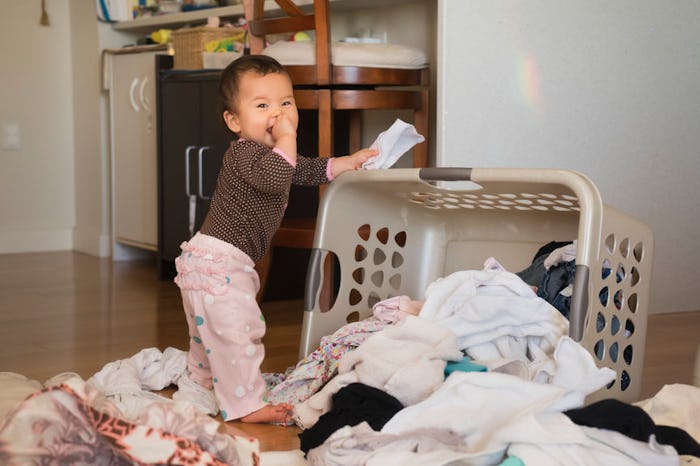Life

Here's How Clutter Affects Your Mental Health, According To Science
Yesterday my 4-year-old decided to dump every last toy out of her toy chest, and then went on to do the same with her sister's toy bins — all the while declaring, 'I love messy!' I was naturally horrified. I'm a bonafide tidier (thank you, Marie Kondo) but it seems like my daughter might be heading in the other direction. So, I have to wonder what might happen if she doesn't outgrow this mess-loving phase. Does clutter affect mental health? Is it possible to thrive even if your house is in disarray?
Anyone who has every watched an episode of Tidying Up With Marie Kondo knows how good it can feel to discard items. But what happens if you do the opposite and let clutter take over? As clutter progresses, it can actually start to impede your life, Catherine A. Roster, a marketing professor at the University of New Mexico, and a consumer psychologist who studies clutter and its impact, tells Romper.
Roster, along with Joseph R. Ferrari of Depaul Univeristy, conducted a study on this very topic that was published in the Journal of Environmental Psychology. The biggest takeaway from her research was the affect clutter has on one's 'psychological home' — a term that defines home as being more than just a dwelling, but a safe space, a refuge, a place of comfort: When you live in clutter, it damages your concept of having that safe space, and when taken to its extreme — hoarding — one's refuge can actually become a prison.
Even if you don't think your clutter issues are that extreme, the growing piles of stuff around your house, or what Roster calls "environmental irritants," can take a toll on everything from your productivity to finances to relationships. If you can't find something, you not only waste time looking for it, but you might end up purchasing a new one, and that means you start having duplicates of things. You're not "utilizing the resources you own," she says. In terms of relationships, your clutter might be preventing you from having people over to our home, or your mess might cause distress in others, even if it doesn't overtly bother you.
It's when clutter starts impeding on your quality of life that it becomes problematic. "It's a matter of progression," explains Roster. If your home is no longer a place of comfort, it's easy to see how it would affect your mental state, leading to more anxiety and depression. However, Roster notes that this is often a cyclical process. People who struggle with depression might be more prone to clutter, and then that clutter leads to feelings of depression, and so on. "Messy homes and work spaces leave us feeling anxious, helpless, and overwhelmed," explained Psychology Today.
And if clutter advances to hoarding, the link to depression is even more clear. A study led by David F. Tolin, and published in Psychiatric Research, confirmed that hoarding participants reporting higher levels of depression.
Interestingly — and maybe not surprisingly — a cluttered home environment might disproportionately affect the mother of the house. A study from UCLA that looked at the relationship between clutter and stress, found that mothers who used words like ""mess," "not fun" and "very chaotic" to describe their homes, were found to have higher levels of diurnal cortisol— a measure of stress, according to UCLA Magazine.
So, what are some steps to take if you feel like your clutter is starting to disrupt your life? Roster recommends making "regular purging" part of your routine, whether that's at the change of seasons, during a kitchen remodel, or even a move. "If you find yourself moving with items that still have tags on them, that doesn't make sense," says Roster.
However, for those who develop deep attachments to objects, parting with things might be hard — harder than just picking it up and seeing if it "sparks joy," notes Roster. In those cases, she recommends soliciting a friend to help, or bringing in a professional organizer.
Interestingly, people with advanced clutter problems or hoarding issues, might not even know how bad things are. "Hoarders tend to have low awareness of the issue," explains Roster. So, if your friends or family members are saying you need to tidy up, it might be worth heeding their advice.
If you or someone you know is seeking help for mental health concerns, visit the National Alliance on Mental Health (NAMI) website, or call 1-800-950-NAMI(6264). For confidential treatment referrals, visit the Substance Abuse and Mental Health Services Administration (SAMHSA) website, or call the National Helpline at 1-800-662-HELP(4357). In an emergency, contact the National Suicide Prevention Lifeline at 1-800-273-TALK(8255) or call 911.